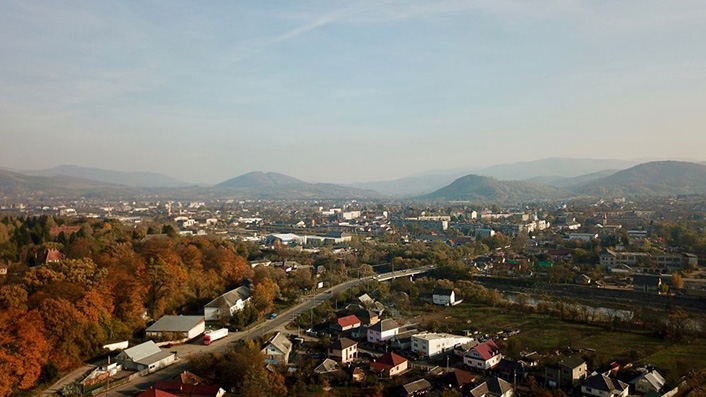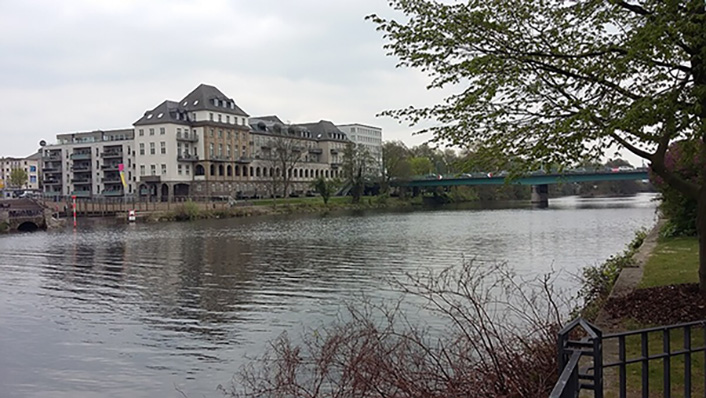Bus from SVALYAVA to MULLHEIM - find a connection and buy a ticket
SVALYAVA

Svalava (ukr. Свалява), a city in western Ukraine, Transcarpathian region, located in the valley of the Latoritsa River. It is a small city with a rich history and a unique location that makes it an important center in the Transcarpathian region.
Svalava's economy is based mainly on agriculture and tourism. The city lies in the picturesque region of Transcarpathia, which attracts tourists, especially those interested in mountain and ecological tourism. The region is home to numerous vineyards, as well as animal husbandry, especially cattle and sheep.
Svalava is also home to a thriving food industry, handicrafts and small-scale manufacturing. Although the city is not one of Ukraine's major industrial centers, it is an important point on the economic map of the Transcarpathian region.
Svalava is located in the northeastern part of the Transcarpathian region, about 50 kilometers southwest of Uzhhorod, the region's capital. The city is well connected to major centers in the region, and its proximity to the borders with Hungary and Slovakia makes Svalava an important point on the cross-border map of Ukraine.
The city is a place where different cultures meet, including Ukrainian, Hungarian and Slovakian, which influences local traditions and daily life. Svalava residents cherish their cultural heritage, organizing festivals, exhibitions and other events that attract tourists.
The region is also home to a number of religious buildings, which testify to the multicultural character of Transcarpathia. There are also local fairs and markets in and around Svalava, where handicrafts and traditional products can be found.
Svalava (ukr. Свалява), a city in western Ukraine, Transcarpathian region, located in the valley of the Latoritsa River. It is a small city with a rich history and a unique location that makes it an important center in the Transcarpathian region.
Svalava's economy is based mainly on agriculture and tourism. The city lies in the picturesque region of Transcarpathia, which attracts tourists, especially those interested in mountain and ecological tourism. The region is home to numerous vineyards, as well as animal husbandry, especially cattle and sheep.
Svalava is also home to a thriving food industry, handicrafts and small-scale manufacturing. Although the city is not one of Ukraine's major industrial centers, it is an important point on the economic map of the Transcarpathian region.
Svalava is located in the northeastern part of the Transcarpathian region, about 50 kilometers southwest of Uzhhorod, the region's capital. The city is well connected to major centers in the region, and its proximity to the borders with Hungary and Slovakia makes Svalava an important point on the cross-border map of Ukraine.
The city is a place where different cultures meet, including Ukrainian, Hungarian and Slovakian, which influences local traditions and daily life. Svalava residents cherish their cultural heritage, organizing festivals, exhibitions and other events that attract tourists.
The region is also home to a number of religious buildings, which testify to the multicultural character of Transcarpathia. There are also local fairs and markets in and around Svalava, where handicrafts and traditional products can be found.
MULLHEIM

Müllheim is a charming town in southwestern Germany, located in the Baden-Württemberg region, in the picturesque Rhine River valley. It is known for its vineyards, beautiful landscapes and rich history. The Old Town impresses with its traditional architecture and pleasant atmosphere, ideal for strolling.
Müllheim is home to the Markgräfler Museum, which showcases the region's history, local traditions and wine culture. Numerous vineyards surround the town, and the local wines are prized throughout Germany. In the area, visitors can visit scenic walking and biking paths leading through hills and forests.
One popular recreational destination is the Markgräfler Nature Park, offering green spaces for relaxation and active pursuits. Also close to Müllheim are the hot springs in Bad Bellingen, which attract lovers of relaxation and water therapies.
Throughout the year, the city hosts many cultural events, including wine festivals where visitors can sample local liquors and learn about the region's wine traditions. Müllheim's location close to the border with France and Switzerland makes it a great place to explore both German and neighboring cultures.
Müllheim is a charming town in southwestern Germany, located in the Baden-Württemberg region, in the picturesque Rhine River valley. It is known for its vineyards, beautiful landscapes and rich history. The Old Town impresses with its traditional architecture and pleasant atmosphere, ideal for strolling.
Müllheim is home to the Markgräfler Museum, which showcases the region's history, local traditions and wine culture. Numerous vineyards surround the town, and the local wines are prized throughout Germany. In the area, visitors can visit scenic walking and biking paths leading through hills and forests.
One popular recreational destination is the Markgräfler Nature Park, offering green spaces for relaxation and active pursuits. Also close to Müllheim are the hot springs in Bad Bellingen, which attract lovers of relaxation and water therapies.
Throughout the year, the city hosts many cultural events, including wine festivals where visitors can sample local liquors and learn about the region's wine traditions. Müllheim's location close to the border with France and Switzerland makes it a great place to explore both German and neighboring cultures.
© 2026 Sindbad
Technical support, assistance, payments: Sindbad IT
© 2026 Sindbad
Technical support, assistance, payments: Sindbad IT